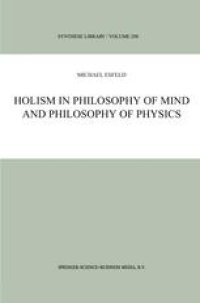
Ebook: Holism in Philosophy of Mind and Philosophy of Physics
Author: Michael Esfeld (auth.)
- Tags: Epistemology, Philosophy of Mind, Philosophy of Science, Pragmatism, Philosophy
- Series: Synthese Library 298
- Year: 2001
- Publisher: Springer Netherlands
- Edition: 1
- Language: English
- pdf
The Scope of the Project The concept of holism is at the centre of far-reaching changes in various areas of philosophy in the second half of the twentieth century. Holism in epistemology and the philosophy of mind is widespread among analytic philosophers subsequent to the work of the later Wittgenstein and to Quine's "Two Dogmas of Empiricism". Roughly speaking, the claim is that (a) for a person to have beliefs, a social, linguistic community is required and that (b) single beliefs have a meaning only within a whole system of beliefs. Furthermore, holism is discussed in science, in particular in the interpretation of quantum physics. In fact, the term "holism" goes back to Smuts (1926), who introduces this term in a biological context. I Holism in any of these areas has considerable consequences for our philosophical view of the world and ourselves. Holism in quantum physics is said to refute atomism, which has been predominant in modem philosophy of nature. Holism in epistemology and the philosophy of mind is seen as an alternative to what is known as the Cartesian tradition, which dominated modem thought down to logical empiricism.
The topic of this book is a comparison between holism in the philosophy and language and social holism on the one hand and holism about space-time and quantum systems on the other hand. The main claim is that holism in the humanities and holism in fundamental physics come under the same substantial, general conception of holism. That is to say: arguments to the effect that the holism of the mental is unscientific or that the mental is separated from the physical owing to holism are not sound. The holism of the mental fits into a world-view that bases itself on scientific realism. The addressees of this book are all those who care about our view of the world and ourselves in the spirit of an argumentative examination of different positions. No familiarity with physics is presupposed.